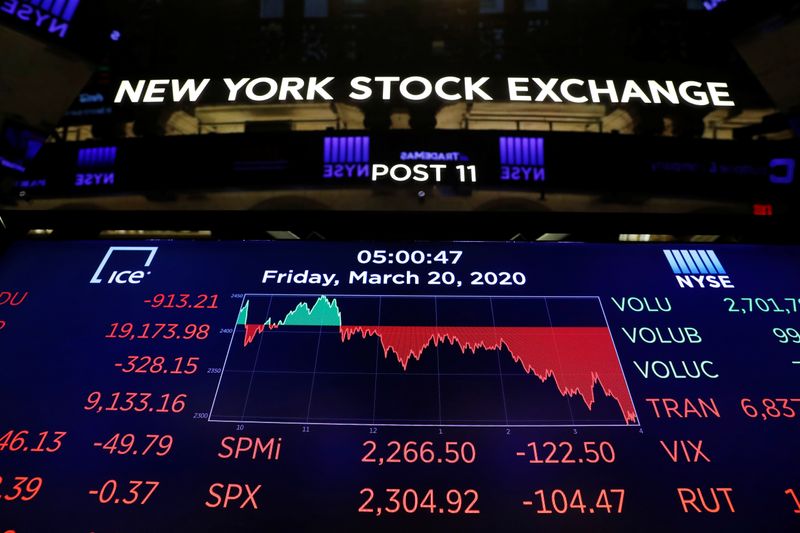By David Randall
NEW YORK (Reuters) - World equity markets began the new quarter with steep losses on Wednesday as evidence mounted that the coronavirus pandemic was sending the global economy into a deep recession.
Traders headed for the safety of government bonds, the dollar [USD/] and gold [GOL/] following sharp slowdowns in manufacturing activity in Japan and Germany, one day after data showed U.S. consumer confidence fell to 3-year lows. New orders for U.S.-made goods fell to an 11-year low and private payrolls fell for the first time since 2017.
MSCI's gauge of stocks across the globe (MIWD00000PUS) sank 3.09% following a 4.5% drop in Tokyo's Nikkei (N225) and broad declines in Europe.
On Wall Street, major benchmarks were sharply lower after President Donald Trump warned late Tuesday that maintaining social distancing guidelines for the next 30 days would be a "matter of life and death."
In midday trading, the Dow Jones Industrial Average (DJI) fell 687.61 points, or 3.14%, to 21,229.55, the S&P 500 (SPX) lost 88.05 points, or 3.41%, to 2,496.54 and the Nasdaq Composite (IXIC) dropped 208.13 points, or 2.7%, to 7,491.97.
"President Trump's warning about two dreadful weeks ahead and 100,000 - 240,000 deaths in the coming months is definitely putting a negative tone on the market," said Societe Generale (PA:SOGN) strategist Kit Juckes. "It is pretty risk-off out there. It is definitely a day of lower bonds yields, falling equity indexes and tin hats."
U.S. markets ended the first quarter on Tuesday, marked by the largest quarterly fall since 1987 for the Dow Jones and the steepest for the benchmark S&P 500 since the financial crisis. The fact it all happened in a month and from record highs made it feel all the more brutal.
U.S. economic activity is likely to be "very bad" and the unemployment rate could rise above 10% because of efforts to slow the spread of the coronavirus, Cleveland Federal Reserve Bank President Loretta Mester told CNBC. [L1N2BO2UT]
In currency markets, the dollar's safe-haven appeal pushed it up 0.6% against a basket of major currencies.
"In my view, markets have still not fully priced in the damage from the coronavirus, with some people still talking about V-shaped recovery," said Masahiko Loo, portfolio manager at Alliance Bernstein in Tokyo.
"The U.S. and Europe are hit by the first wave now, but as you can see in Asia, there could be more waves from re-imported cases. Human psychology also does not quickly recover either after an experience like this."
Traders jumped toward the perceived safety of government bonds, pushing the yield on the benchmark 10-year U.S. Treasury note to 0.5957% from 0.699% late on Tuesday.
Commodity markets were much rougher. Brent crude (LCOc1) fell more than 5% to approximately $25 per barrel as the United States, Russia, and Saudi Arabia jostled over a massive oversupply of oil. [O/R]
Crude oil benchmarks ended the first quarter with their biggest losses in history. Both U.S. and Brent futures got hammered throughout March by the pandemic and a Saudi-Russia price war.

Global demand has been cut sharply by travel restrictions. Forecasters at major merchants and banks see demand slumping by 20% to 30% in April, and for weak consumption to linger for months.